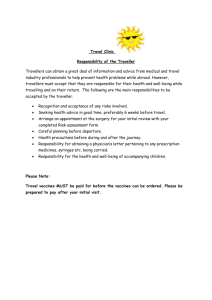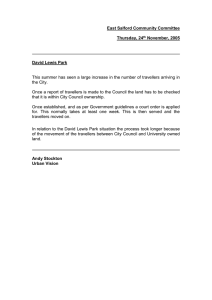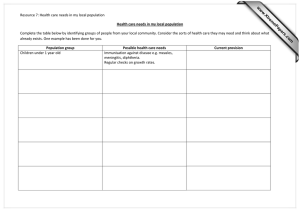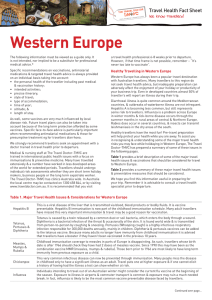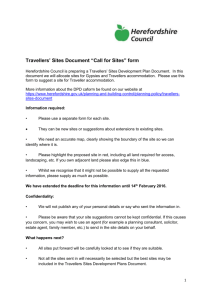Bali fact sheet
advertisement
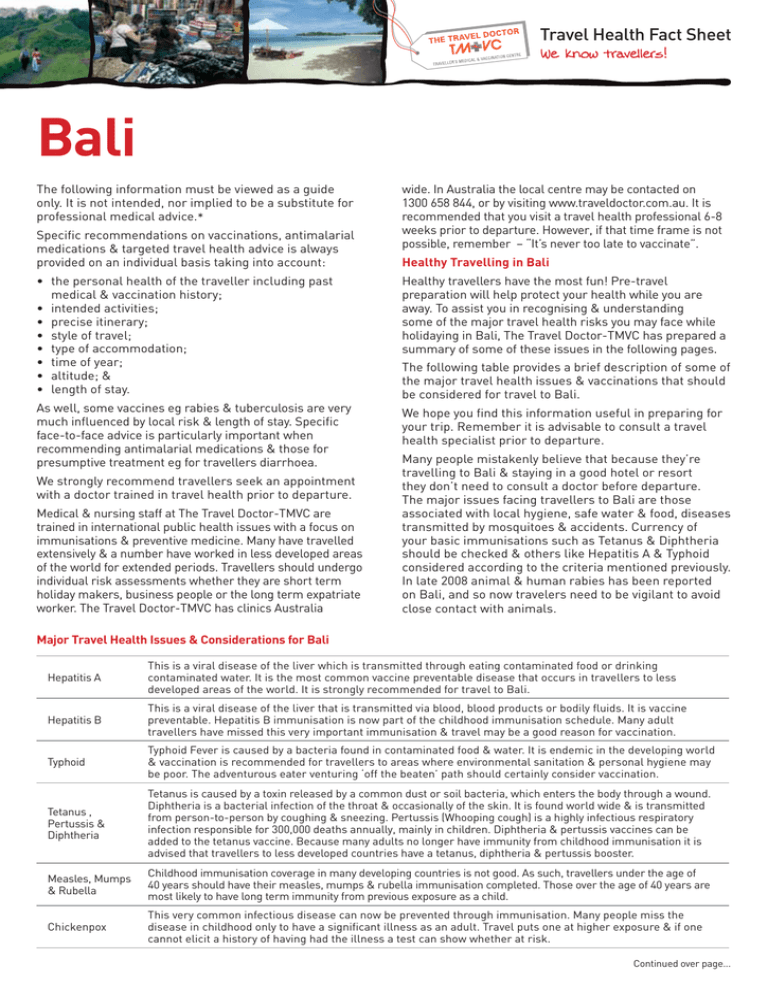
Travel Health Fact Sheet We know travellers! Bali The following information must be viewed as a guide only. It is not intended, nor implied to be a substitute for professional medical advice.* Specific recommendations on vaccinations, antimalarial medications & targeted travel health advice is always provided on an individual basis taking into account: wide. In Australia the local centre may be contacted on 1300 658 844, or by visiting www.traveldoctor.com.au. It is recommended that you visit a travel health professional 6-8 weeks prior to departure. However, if that time frame is not possible, remember – “It’s never too late to vaccinate”. Healthy Travelling in Bali •the personal health of the traveller including past medical & vaccination history; • intended activities; • precise itinerary; • style of travel; • type of accommodation; • time of year; • altitude; & • length of stay. Healthy travellers have the most fun! Pre-travel preparation will help protect your health while you are away. To assist you in recognising & understanding some of the major travel health risks you may face while holidaying in Bali, The Travel Doctor-TMVC has prepared a summary of some of these issues in the following pages. As well, some vaccines eg rabies & tuberculosis are very much influenced by local risk & length of stay. Specific face-to-face advice is particularly important when recommending antimalarial medications & those for presumptive treatment eg for travellers diarrhoea. We hope you find this information useful in preparing for your trip. Remember it is advisable to consult a travel health specialist prior to departure. We strongly recommend travellers seek an appointment with a doctor trained in travel health prior to departure. Medical & nursing staff at The Travel Doctor-TMVC are trained in international public health issues with a focus on immunisations & preventive medicine. Many have travelled extensively & a number have worked in less developed areas of the world for extended periods. Travellers should undergo individual risk assessments whether they are short term holiday makers, business people or the long term expatriate worker. The Travel Doctor-TMVC has clinics Australia The following table provides a brief description of some of the major travel health issues & vaccinations that should be considered for travel to Bali. Many people mistakenly believe that because they’re travelling to Bali & staying in a good hotel or resort they don’t need to consult a doctor before departure. The major issues facing travellers to Bali are those associated with local hygiene, safe water & food, diseases transmitted by mosquitoes & accidents. Currency of your basic immunisations such as Tetanus & Diphtheria should be checked & others like Hepatitis A & Typhoid considered according to the criteria mentioned previously. In late 2008 animal & human rabies has been reported on Bali, and so now travelers need to be vigilant to avoid close contact with animals. Major Travel Health Issues & Considerations for Bali Hepatitis A This is a viral disease of the liver which is transmitted through eating contaminated food or drinking contaminated water. It is the most common vaccine preventable disease that occurs in travellers to less developed areas of the world. It is strongly recommended for travel to Bali. Hepatitis B This is a viral disease of the liver that is transmitted via blood, blood products or bodily fluids. It is vaccine preventable. Hepatitis B immunisation is now part of the childhood immunisation schedule. Many adult travellers have missed this very important immunisation & travel may be a good reason for vaccination. Typhoid Typhoid Fever is caused by a bacteria found in contaminated food & water. It is endemic in the developing world & vaccination is recommended for travellers to areas where environmental sanitation & personal hygiene may be poor. The adventurous eater venturing ‘off the beaten’ path should certainly consider vaccination. Tetanus , Pertussis & Diphtheria Tetanus is caused by a toxin released by a common dust or soil bacteria, which enters the body through a wound. Diphtheria is a bacterial infection of the throat & occasionally of the skin. It is found world wide & is transmitted from person-to-person by coughing & sneezing. Pertussis (Whooping cough) is a highly infectious respiratory infection responsible for 300,000 deaths annually, mainly in children. Diphtheria & pertussis vaccines can be added to the tetanus vaccine. Because many adults no longer have immunity from childhood immunisation it is advised that travellers to less developed countries have a tetanus, diphtheria & pertussis booster. Measles, Mumps & Rubella Childhood immunisation coverage in many developing countries is not good. As such, travellers under the age of 40 years should have their measles, mumps & rubella immunisation completed. Those over the age of 40 years are most likely to have long term immunity from previous exposure as a child. Chickenpox This very common infectious disease can now be prevented through immunisation. Many people miss the disease in childhood only to have a significant illness as an adult. Travel puts one at higher exposure & if one cannot elicit a history of having had the illness a test can show whether at risk. Continued over page... Influenza Individuals intending to travel out of an Australian winter might consider the current flu vaccine at the beginning of the season. Exposure to illness in airports & commuter transport is common & exposure may ruin a much needed break. Cholera Cholera is a severe, infectious diarrhoeal disease common in developing countries. It is associated with conditions of poverty & poor sanitation. It causes a sudden onset of extremely profuse, watery diarrhoea within one or two days after contact with the bacteria. Rapid dehydration can occur. Travellers who follow guidelines for eating & drinking safely will minimise the risk of contracting cholera. An oral vaccine is now available. Malaria Malaria is transmitted by a night biting mosquito. The risk of exposure is very low in Bali, particularly when the stay is restricted to the main tourist areas. Medications to reduce the risk of disease are not generally recommended but any illness which is flu-like in nature after returning should still be checked for malaria. Dengue Fever Dengue (pronounced den-gee) Fever is a viral disease with flu like symptoms that is transmitted by mosquitoes. There is no vaccine for dengue fever & prevention is based upon insect avoidance via repellents, nets & insecticides. Japanese Encephalitis (JE) JE is a mosquito borne viral disease prevalent in rural areas of Asia & Indonesia that can lead to serious brain infection in humans. Risk is usually greatest during the monsoon months. A vaccine is available & is particularly recommended for adults & children over 12 months of age who will be spending a month or more in rice growing areas of countries at risk (or who repeatedly visit such areas). It is also recommended for people travelling to an area where an outbreak is known to be occurring. Insect avoidance should be considered the primary means of defence. Rabies Rabies is a deadly viral infection of the brain transmitted to humans. The disease itself is rare in travellers, but the risk increases with extended travel & the likelihood of animal contact. The best way to avoid rabies is too avoid all contact with animals. Dogs are the main carriers; however monkeys, bats, cats & other animals may also transmit the disease. Pre-exposure vaccination is recommended for extended travel & those who work with, or are likely to come in contact with animals. Regular tourists do not need to be pre-immunised routinely, but must report any animal bites so post-exposure treatment can be administered. Traveller’s Diarrhoea Up to 40% of tourists may develop 3 or more loose bowel motions a day within the first week of travel. A variety of germs can be responsible for this infection & a Traveller’s Medical Kit containing appropriate therapy can rapidly improve the symptoms. It is also important to follow the rules of healthy eating & drinking to minimise risks. Additional fact sheets can be found at the Travel Doctor-TMVC website www.traveldoctor.com.au. These include fact sheets about: • eating & drinking safely; • cholera; • Japanese encephalitis; • insect avoidance measures; • traveller’s medical kits. Travelling With Children – Special Considerations Bali is also a wonderful family holiday destination. When travelling with children there are a number of travel health considerations that should be taken into account to assist you in having a safe & healthy family holiday. •Choose your destination carefully – being in an isolated area with a sick young child can be very stressful – particularly if communications in the area are poor. •The flight – Infants may need to breast feed or suck a bottle as the aeroplane takes off or lands. Swallowing helps their ears equalise & prevent ear pain. Older children may find it helpful to suck a lolly. • Eating & drinking – Following the general eating & drinking safely rule of “boil it, cook it, peel it--or forget it” is particularly important. Children under 3 years of age tend to get diarrhoea which is more severe & lasts longer than in adults. As much as possible, watch what they eat & don’t let children drink untreated water, even for teeth brushing. Carry “wet ones” or antiseptic hand wash so you can clean their hands regularly. •Hot & Cold Climates – Be careful to protect children from extremes of heat or cold. Beware of frostbite on tiny fingers & toes. Children cannot regulate their body temperature as well as adults. Offer fluids regularly as children dehydrate rapidly & their thirst sensation is unreliable. Use blockout when necessary. •Accidents – While travelling, you have less control over a child’s environment. Drownings, poisonings, burns & falls are particular hazards. Closely supervise children around animals -remember Australia & New Zealand are two of the few rabies free areas in the world. Remember to check the DFAT ‘Smartraveller’ website www.smartraveller.gov.au prior to departure Travel Health Fact Sheet Bali Copyright © The Travel Doctor-TMVC Pty Ltd 2012 The Travel Doctor-TMVC is part of the Medibank Health Solutions Division Clinics Australia Wide. To find your nearest clinic call 1300 658 844 or visit www.traveldoctor.com.au *This material has been prepared for general information purposes only. It is not intended to be relied on as a substitute for professional medical advice. No person should act, fail to act, disregard professional medical advice, or delay in seeking professional medical advice on the basis of this material. The Travel Doctor-TMVC does not guarantee the accuracy, currency or completeness of any of this information and will not be liable for any loss, damage or injury directly or indirectly caused by this material or its use.
